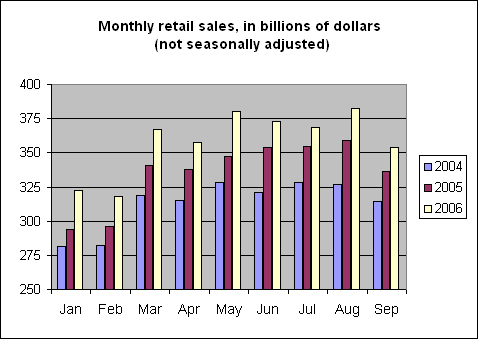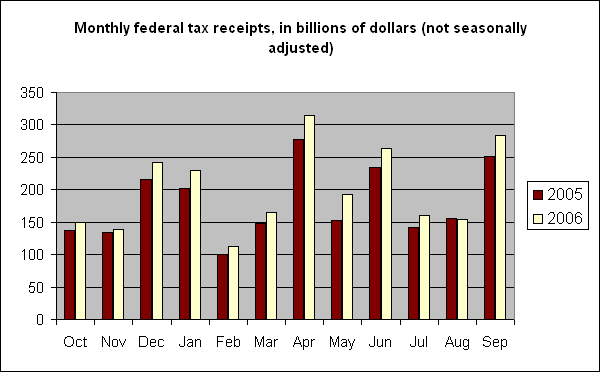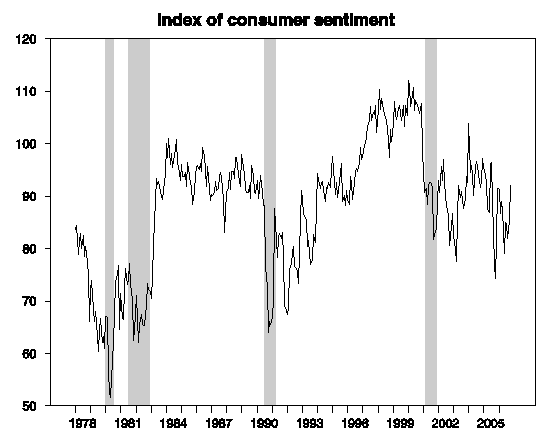The latest data on retail sales, tax receipts, and consumer sentiment all look consistent with the soft landing scenario.
The Census Bureau reported today that September seasonally adjusted retail sales were down 0.4% compared with August. Most analysts took cheer from the fact that, if one excluded the plunge in gasoline, sales would instead have been up 0.6%. Notwithstanding, Barry Ritholtz argues that the sum of all sales is the relevant measure, and Calculated Risk thinks this means that inflation-adjusted retail sales declined overall in the third quarter. But even including everything, seasonally unadjusted September sales are still 5% above the September 2005 value. I read these data as consistent with the hypothesis that the economy is soft, but not crashing.
 |
The drop in federal tax receipts that worried me a little last month appears to have been a temporary aberration, with September 2006 revenues suggesting incomes are still solid:
 |
And the Michigan index of consumer sentiment is in the midst of a strong rebound:
 |
Perhaps not as scary a Halloween as some of us were anticipating.
Technorati Tags: macroeconomics,
retail sales
Please stop poking reality-based sticks into the spokes of the doom-and-gloom cyclists. You are inteferring with their certitude that the monetary system is collapsing and that resource starved cannibals will soon be pillaging their neighborhoods. Even with their training wheels on, these jabs of sanity might cause them to fall over.
I disagree, they give the hard landing idea ala 2001. The key is severity.
Tax recipts didn’t tale off to 2001, retail sales didn’t much either. Your falling into the “data” trap and missing the obvious.
Which obvious? Despite my call position, I am probably more bearish than most, as I expect a housing slowdown to ripple through consumption and production, but these numbers are fine.
Retail sales did slump in 2001. Cf my chart at http://www.bignose.org/~wcw/realretail.png
From everything I’ve seen, consumer sentiment data reflects gas prices, jobs growth, and the stock market. Nothing wrong with using one chart instead of three, but is there any academic research suggesting sentiment data adds information not contained in other indicators?
These numbers are fine even though total retail sales FELL in Q3? No matter how you spin it, that isn’t that “fine”.
One glaring thing about that sentiment chart stands out, to me:
It looks like we never recovered from the ’01 recession. I hadn’t previously realized this fact was so starkly obvious.
Other than that, it still appears to me the consumer economy has peaked. The year-to-year change comparing 04/05 and 05/06 seems to be smaller, suggesting a deceleration of growth. This data is all consistent with the “heading into recession” hypothesis. I wouldn’t break out the champaign yet–potential major pain in the housing sector has barely begun.
Also: why is no one reporting on the continued build-up in inventories (and the trade deficit, for that matter)? Would this poke a “reality-based hole” in the stock market rally?
This recent flow of data is starting to suggest the market had it wrong and the Fed got it right. The US consumer remains resilient in the face of a slowing housing market…and surprise, surprise, that’s what has also recently happened in economies all around world as house prices have slowed.
LOL, the housing bust has just gotten started and you can say that?
Psst, Retail Sales dropped in Q3, thus nominally providing NO growth in Q3………whoops. No such thing as “ex” or “internals”, typical company line BS. They dropped and GDP is flattening.
Would you say Abo that this remark
ignores the possibility of any lag effect due to MEW?
But, to be fair, the UK which leads us by more than a year (house price peak anyway) has not yet had that hard landing.
It’s early is my view with the US consumer playing such a pivotal role in all those “economies around the world”.
I look at the consumer sentiment chart and it strikes me that the drive-by media talk the economy down during Republican administrations.
Here’s one of those “drive-by” media reports…that always bash Republican administrations:
Joe Richter from Bloomberg states confidently
knowing that gasoline prices do have this effect (and there is no ex-pump price confidence if you wanted to chase the volatility out of the room) and that the participation in the stock market is, well, a tad light unless you’re wealthy.
I do like the conclusion that the sentiment was caused by the current state of the economy –the thing we are trying to evaluate…but what does Joe know about begging the question?
And this was a drive-by shooting at Republican administrations? Rich, this was a goosing of the data. Joe is on your side knowing that the holiday cash will come from the savings at the pump for those who have spent their MEW.
Not the same magnitude but we Americans are resourceful and the money will come from somewhere…even lower gas prices?
Calmo-
If you define wealthy as “owning stock”, I suppose that you are right, but stock ownership is rather widespread – according to the SEC, 48% of households own mutual funds, with a median balance of $142K (2005).
Furthermore, finding one article reporting positive news is not that impressive, compared to the blizzard of stories about rising gas prices and the housing market woes. The news that the deficit has been halved 3 years early and the upward revision in the jobs number by 800k+ haven’t been shouted from the treetops by the DBM.
That number for median mutual fund holdings looks much too high–the 2006 investment company factbook
(http://www.icifactbook.org/06_fb_sec6.html) puts the number at $48000 for households which own funds.
And the deficit hasn’t been cut in half yet either. 2004 deficit was 412.7bn, the 2006 deficit was $248bn. Since Congress was incapable of passing most of the FY2007 spending bills on time, there is no telling what the 2007 deficit might be.
And I think it is too early to tell how soft the landing will be–all these series are kind of noisy, and the housing series are really noisy. By the end of the spring housing season I think we will know what is happening.
Sorry Matt, but when Bush made the promise the 2004 fiscal year was less than half over and the projection was 477 MM (4.2% of GDP). It’s down to 248 MM and less than 2% of GDP – three years early. That’s a fact – not arguable.
I could be misled by the report that the top 1% own 58% of the stock market, but I’m sure it would be an under-estimate.
Do get your head out of the sand on this one Rich
and recognize terms like “median” shed precious little light on distributions.
Last thing (before I get distracted by your sub-standard “MM”):
If the budget deficit has made such a dramatic recovery, where would you find that activity/business/wealth creation/ New Big Thing that has so far eluded that nasty Dem-leaning press? Does the President give us any clues on his web-site? (That must be immune from the contamination that you think is polluting our Republican bashing press, yes?)
Rich,
Don’t get pulled in by the idea that the media can drive markets. Markets are driven by fundamental economic conditions. Any effect the media has is very small and very short lived.
The media can have an effect on an election by reporting only the facts that support an agenda while ignoring reports to the contrary, but markets and much more reasonable. This should be clear by looking at your own investing. Do you just throw your money at the latest media story without checking it out? If so you will not be an investor very long.
Dick-
As a long-term investor, I don’t worry too much about the day-to-day fluctuations. I don’t think the MSM affects long-term markets, but rather was reacting to an earlier comment that the ’01 recession had never ended. I assumed that commenter was referring to the consumer confidence graph, which was relatively flat in the 80’s and the period since 2001. I think the MSM has a rather important effect on consumer confidence.
Rich,
Good remarks on the deficit. Makes sense to me. Nevermind this…
Thanks Rich. I understand. Actually I don’t put much confidence in consumer confidence because it usually peaks just when things turn bad and it usually reflects events 3 months old. And as you point out it is susceptible to media manipulation.
Yes, things are not now so scary, but what about that nasty little fly called inflation? As I’ve repeated several times in these pages, rising interest rates do not create more oil in the ground.
Today’s PPI numbers suggest trouble and likely will cause some headscratching at the Fed. I *do* like how those numbers are presented in the news: “the falling cost of motor fuels sharply reduced wholesale prices blah blah.” What do they think, other than fuel price (call it oil price), caused core prices to jump a whopping 0.6%?
Matt-
You are right about the median value of the equity holdings. I picked up the mean, which is skewed by larger holdings. Mea culpa.
Rich